Medical Myths

Do carrots really improve your eyesight? Can people with darker-colored skin still get a sunburn? How much of our brain do we actually use? And can a woman get pregnant while she’s menstruating?
One survey by the Pew Health Group found that 48 percent of Americans believe antibiotics are effective when treating the common cold or flu – a belief that is most definitely false. Another piece of research found that most Americans don’t really understand how health care works and when it’s appropriate to go to urgent care rather than the emergency room. And despite the fact that heart disease kills 1 in 4 Americans, a Cleveland Clinic study found that few of us know much about its dangers, causes or symptoms.
So how much do we really know about our health? And how many of the things we believe are actually myths? We surveyed more than 2,000 people to find out. Keep reading to learn more.
Myths Most of Us Believe
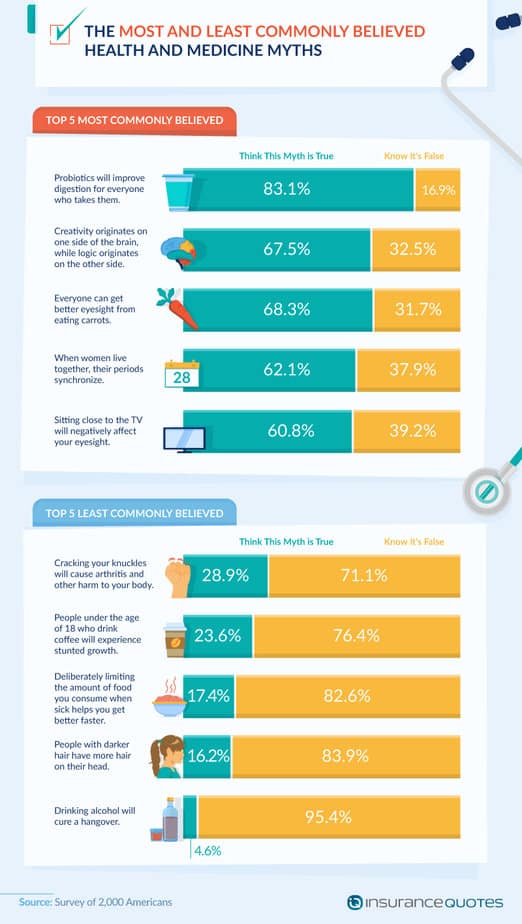
Here’s the truth: Some of the things we believe about our health aren’t quite true. We ran several common myths past our survey respondents, and we found that they are still as prevalent as ever.
For example, most people believed that taking probiotics will help improve their digestion – which explains the $41 billion global market for probiotic products including supplements and yogurt. But for most, these products are ineffective – in fact, only people who suffer from a few specific ailments will experience any benefit at all – the public perception of probiotics as a digestive panacea is a myth.
And plenty of us think the whole left brain, right brain thing makes sense – most people still believe that creativity originates in one side of the brain, and logic in the other – but in the words of LiveScience, “it’s all bunk.”
What’s more, the idea that eating carrots will improve your eyesight – regardless of what your parents may have told you – is really only true for people who suffer from Vitamin A deficiencies. Turns out, most Americans would not experience better eyesight by upping their carrot intake.
Medical Beliefs, by Race and Ethnicity
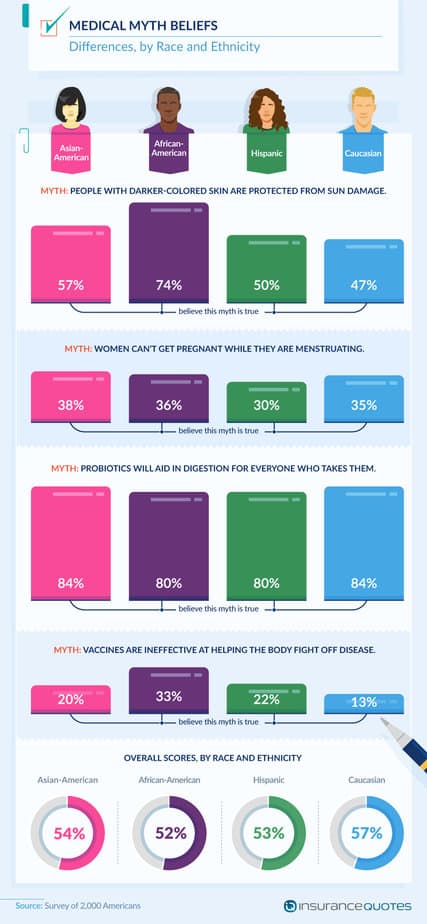
Do darker-skinned people have to worry about sunburns and skin cancer, or does increased melanin protect from the dangers of the sun? It turns out, the answer is that we’re all at risk for sun damage.
When we asked survey respondents, however, plenty of people believed the myth. And, surprisingly, African-American participants were most likely – by a large margin – to believe that having darker skin provides protection, a dangerous belief if it encourages people to forego their sunscreen.
Much has been said recently regarding the safety and effectiveness of vaccines, and as a result, a significant percentage of us believe that vaccinations are ineffective at helping the body fight off disease. Although the evidence is clear, and it’s well-documented that they do just that, this myth still persists among a third of our African-American respondents.
For the other myths we surveyed, differences between groups were smaller. Asian-Americans were most likely to believe that women couldn’t conceive during their menstrual cycle, but even the most informed group on this subject (those identifying as Hispanic) wasn’t too many percentage points behind.
Why We Believe What We Believe
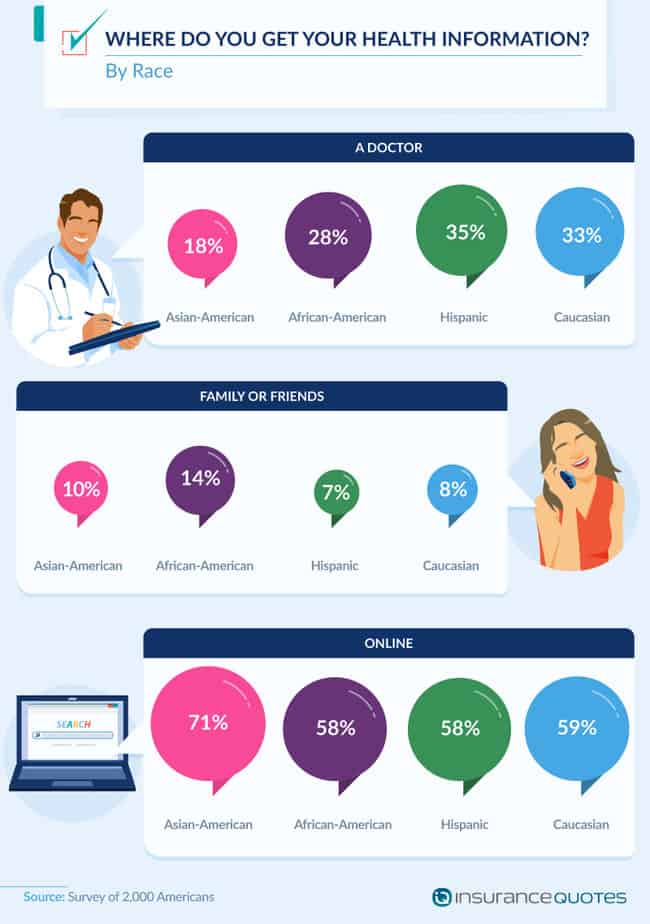
If beliefs vary by race, the next question is why? Why are Caucasians and Asian-Americans more likely to believe in the digestive benefits of probiotics? And why are Hispanic individuals more informed about conception?
In an attempt to find an answer, we asked survey respondents where they got their health information. Unsurprisingly, the majority of every group said they got their information online – a concerning answer when you consider that anyone, including those with a political or business agenda, can create a website, run a study or otherwise publish misleading information online.
The second most popular answer across all groups was the doctor and family or friends. The group putting the most trust in physicians was Hispanics, which may account for their relative savvy on myths about pregnancy and sun damage.
Women’s Health: Who’s Got the Scoop?
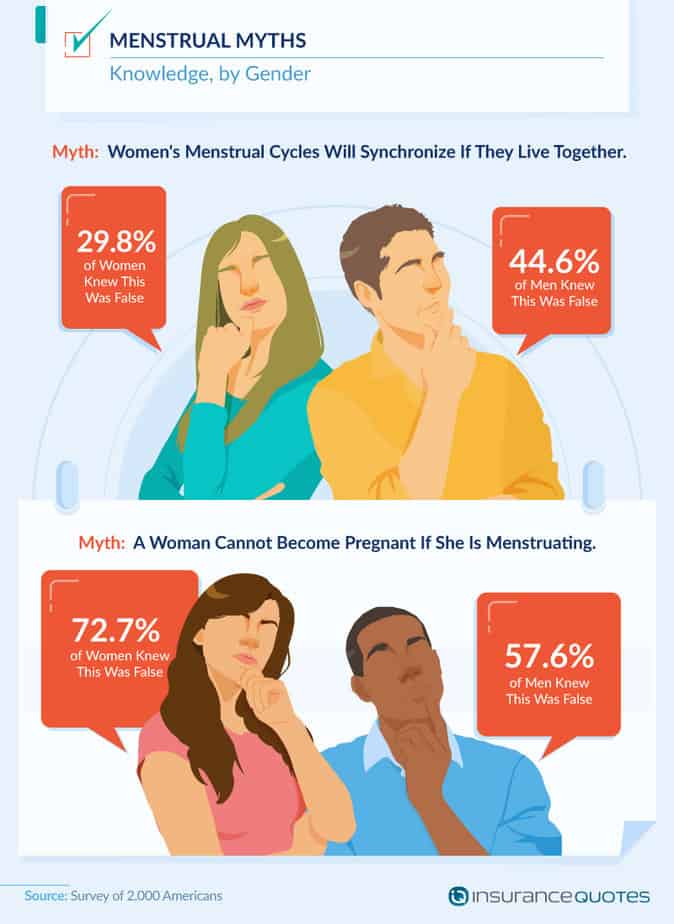
It’ll come as no surprise that when it comes to pregnancy, women were more likely than men to recognize a myth when they saw one. Because the truth is that, yes, a woman can get pregnant during her period. About 73 percent of women surveyed knew this fact, while only about half of men were as well informed.
On the other side of the coin, women were more likely than men to believe that menstrual cycles sync up when ladies live in close proximity. The truth here is a little more complicated: some studies show evidence of syncing and some studies don’t, and the studies that don’t are the more recent ones. Which makes this belief based more on hearsay than scientific evidence.
How Much Brain Power Do We Really Use?
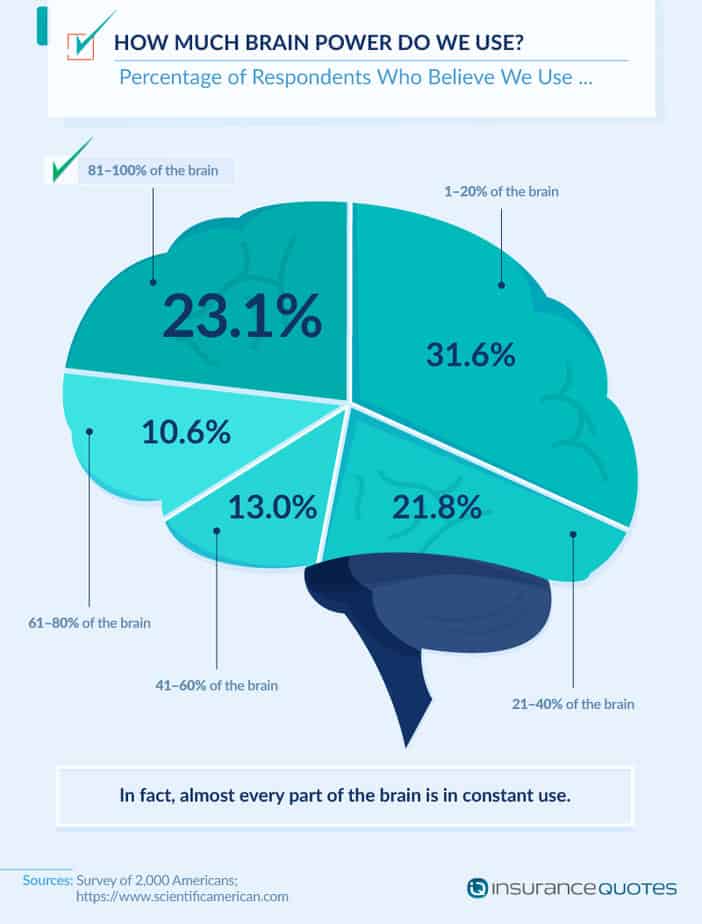
Here’s a myth we’ve probably all heard before: Human beings only use 10 percent of their brain. However, that’s not even close to being true. According to neurologist Barry Gordon at Johns Hopkins School of Medicine in Baltimore, quoted in an article in Scientific American, the idea is so false that it’s “laughable.” What’s the real scoop? The truth is that we use all of our brain – and we use almost every part almost all of the time. Only 23 percent of survey respondents got that one right.
Health Knowledge, by Industry
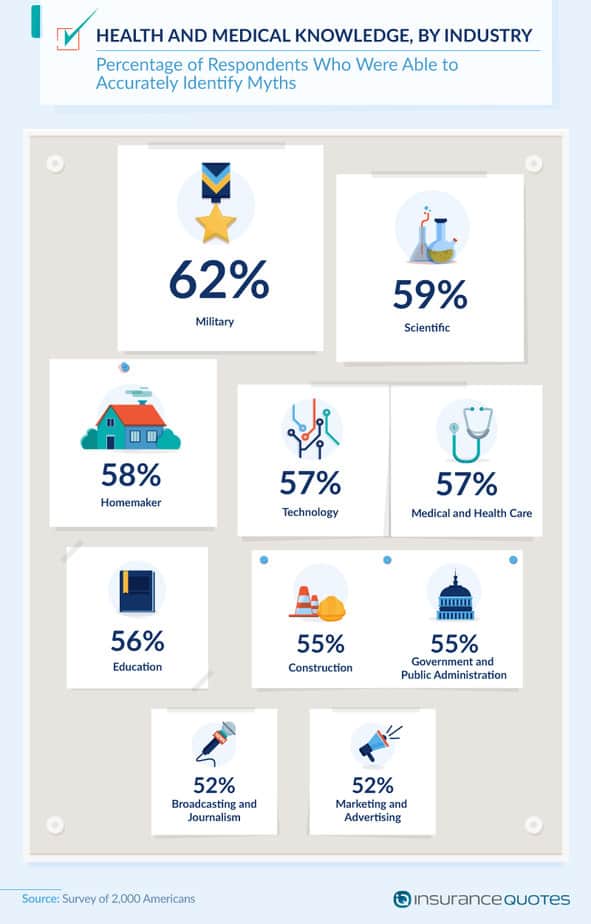
When we break down our data by industry, turns out some professions are easier to fool than others. The group able to most accurately identify the myths? Military personnel. The groups least likely? Those in the advertising and journalism fields.
The big surprise here is that people in the medical field didn’t lead the pack. It seems working in close proximity to health truths doesn’t immunize us from believing the myths.
Health Knowledge, by Education Level
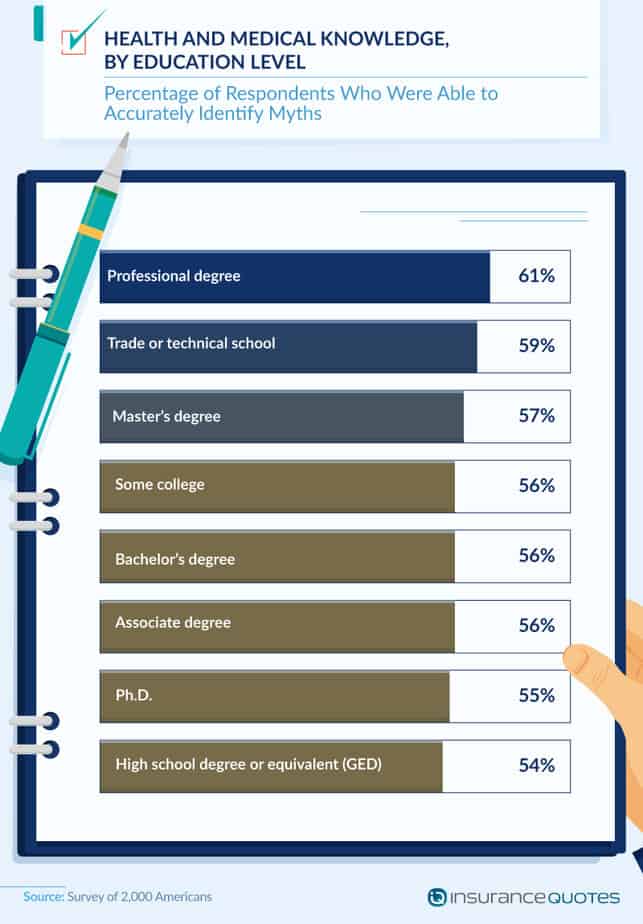
So, what happens when we break down the data by education level? Are PhDs more health-aware than the rest of us? Turns out, the answer is no! Those with a high school education or GED were the least likely to spot the medical myths, but those with doctorates were actually the second least likely. Leading the way in myth-busting were those with professional degrees followed by technical and trade school graduates.
Don’t Believe Everything You Hear
When it comes to medical information, there’s a lot of incomplete – and sometimes just plain false – information out there, which is why it’s important to always do your research, question your assumptions and take responsibility for your health.
If you have a question, make sure you look for answers from trusted sources, like your doctor. If you’re searching online, carefully evaluate your sources. And, of course, make sure you have the health insurance coverage you need to see a doctor when you need to.
Methodology
We analyzed the responses of 2,018 survey respondents to test their knowledge about commonly believed medical myths. For demographic groups with fewer than 10 total respondents, we discarded the data before analysis.
SOURCES
https://news.aetna.com/2015/04/survey-finds-americans-health-literacy-lacking/
https://www.cdc.gov/heartdisease/facts.htm
http://www.sfgate.com/health/article/Survey-finds-Americans-lack-heart-disease-5246370.php
http://www.webmd.com/digestive-disorders/features/probiotics-benefits#1
https://www.cdc.gov/vaccines/parents/vaccine-decision/
http://www.livescience.com/39373-left-brain-right-brain-myth.html
https://www.scientificamerican.com/article/fact-or-fiction-carrots-improve-your-vision/
http://www.skincancer.org/prevention/skin-cancer-and-skin-of-color
http://www.highlighthealth.com/resources/searching-for-health-information-online-dangerous/
http://www.webmd.com/women/guide/5-things-about-your-period#1
https://www.scientificamerican.com/article/do-women-who-live-together-menstruate-together/
https://www.scientificamerican.com/article/do-people-only-use-10-percent-of-their-brains/
Fair Use Statement
The content on this page is made freely available for noncommercial use (and that’s no myth). If you do use this content, please provide proper attribution by linking back to this page and crediting insuranceQuotes.
